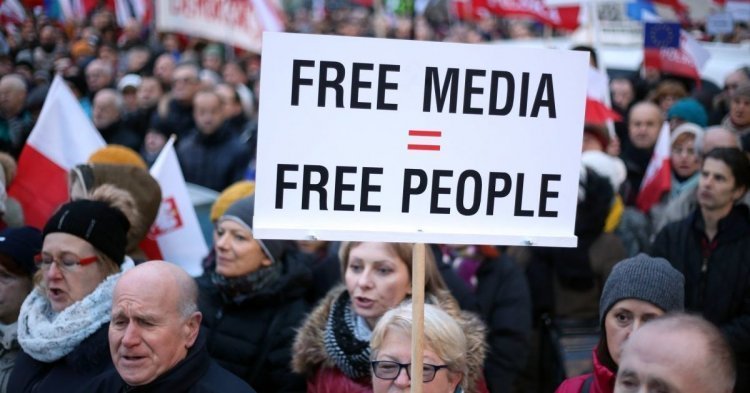Press freedom as a guarantee of democracy
There is nothing strange about it, everyone has his own point of view, just as every single entrepreneur has individual plans for the development of his business. The problem lies elsewhere. Freedom of the press is not something abstract and it is not an enforceable principle of media impartiality either. It is a guarantee that everyone has the right to write and publish information in the form chosen by themselves, and with the message which they consider appropriate, regardless of how much someone else could possibly disagree with their or their publisher’s point of view.
There is no civilised community or any other organisation that is able to function effectively without the rule of law. One does not find any difference in the case of the media. Above-mentioned personal views and commercial interest cannot be the starting point of journalistic populism and disrespect for professional ethics. It is especially important if we look at journalism itself. Called the “fourth power”, in an analogy to the Montesquieu theory, journalism is one of the key areas for the rightful functioning of the democratic state of law.
Public media should uphold reliable news broadcasts
In the end, it is the media that largely create the worldview of those who are to busy and don’t have enough time to thoroughly analyse the political reality. Respect for the right to privacy, prohibition of totalitarian ideology, care for the quality of language, admissibility of biased opinions, but with respect to facts and a good taste, lack of social-financial cooperation of journalists and politicians - these are only examples of principles whose observance has a great importance for contemporary democracy. If one wonders where the truly right place for a completely impartial media coverage is, then it is in the public media where one should find the basis of reliable knowledge. There is no place for political commentary, but only a substantive explanation and ridicule of the spreading fake news.
Hateful messages, fake news and politicised public media
Unfortunately, these rules are not respected throughout Europe, and Poland is one of the most prominent examples in this respect. Public media, instead of being an objective source of knowledge, are sometimes used as a crude propaganda machine. Recently, even a deputy of the ruling party did not seem to conceal that the transmission of state television is directed to the worst-educated social group, seemingly suggesting their susceptibility to simple manipulations.
The growing influence of progressively developed virtual media using websites such as YouTube or amateur network is still subject to internal regulations of private entities, that feel social pressure or - possibly - a moral need to bring an order to their own platforms. Unfortunately, governments of some countries seem to neglect the unquestionable problem of aggressive, extreme-right authors, whose brutal message sometimes equates them with the primitivism of propaganda. In Poland, the government neglects the problem and seems to do so as long as the aggression will be focused mainly on their political enemies. Consciously or not, they have to take into account the risk that this online hate machine may at some point hit their own political environment.
What will happen next?
It is more and more obvious nowadays that Polish public media, as well as media law, cannot simply be restored to the condition before the Law and Justice party took power. This kind of action would consist in a simple replacement of staff - however, it would avoid any systemic solutions. These issues should be regulated as soon as possible so that the state becomes a link of reliable information, fighting the growing wave of network aggression and fake news.
What will happen next? It depends only on us. We all have to remember that pressure and cooperation make sense especially when it comes to fundamental values of democracy.


Follow the comments: |
|
